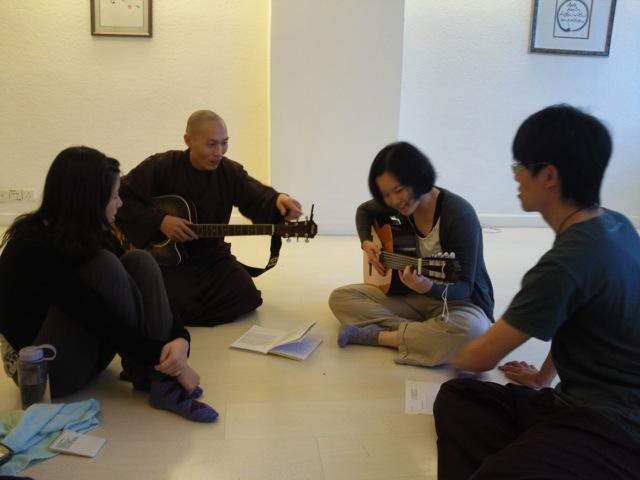
Humanity has invested awesome amounts of energy and emotion into music. Many will relate playing or listening to music as something akin to a spiritual experience. It is claimed that music is something like living a philosophy, where one expresses a way of life through sounds other than words. I agree. But music is expressed in so many ways, and unskillful expressions can result in violent, immoral messages or ideas devoid of substance (and consequently awful lyrics). Of course, “good” music is always subjective. But by learning about spiritual music, we can enrich and refresh our spiritual life by adopting its qualities into our daily activities.
Music that claims spiritual inspiration (and therefore are in a different category to traditional hymns, gathas, chanting, and other liturgical pieces) challenges our negative emotions and perceptions. It is composed and performed with the intent of breaking through the conventional and empty assumptions of conformist establishments. Consider “Song of the Wind”, a musical piece from Plum Village. Its female vocalist is accompanied by instruments that invoke the Celtic world of rolling green fields, ghostly skies, and lush, secret groves (including a lute and flute). The ethereal atmosphere is complemented by the background resonance of blowing wind and echoing voices. It is difficult not to feel emotionally immersed in this European celebration of Zen.
“Song of the Wind” consists of three verses about the wind, sky, and moon that have neither name nor words. Yet they are real; they can be seen. And in this way they reflect the quiet voice of the transcendent Presence. In these reflections, disciples can reflect on their own about the world and its awe-inspiring phenomena. We are called to change our ways of thinking and look at things more holistically, in a more interconnected way. We need to ‘upset’ the established order of convention. This begins with thinking in new, different ways, leaving our old habits and negative patterns behind.
The saying goes: “music is a universal language.” This does not mean that music is a lingua franca like English. It is more accurate to say that music conveys emotions and sentiments, which all human beings understand. These emotions can be negative, but they can also be uplifting and inspiring – they can be spiritually rewarding for our everyday lives. Only by using music correctly can it change lives and refresh perspectives.
Notes: Lyrics to Song of the Wind
I listen to the song of the wind that has no name
I listen to the song of the wind that has no words
I listen to the song of the wind that I can see
The wind is real, the wind is real
I listen to the song of the sky that has no name
I listen to the song of the sky that has no words
I listen to the song of the sky that I can see
The sky is real, the sky is real
I listen to the song of the moon that has no name
I listen to the song of the moon that has no words
I listen to the song of the moon that I can see
The moon is real, the moon is real












